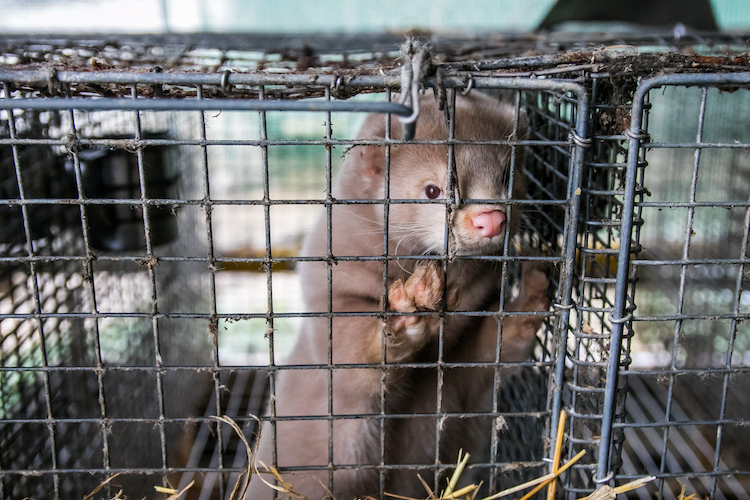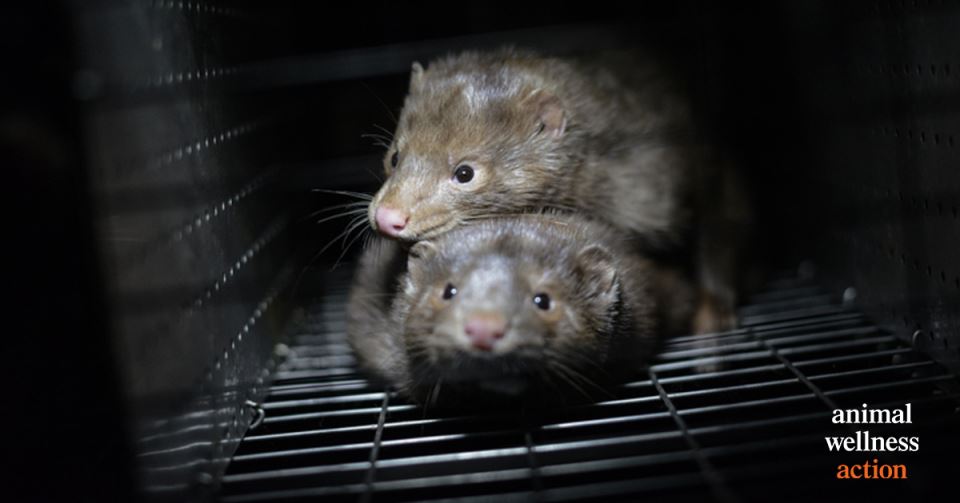
The Cruelty and Contagion of Mink Farms
The 2011 movie “Contagion” turned out to be prescient. The movie, featuring Matt Damon, posited a world-wide pandemic from a “zoonotic virus” (one that jumps from one species into another) that rapidly turns deadly as one of the film’s main characters says, “The wrong bat met the wrong pig.”
And just as the Spanish flu of 1918 gained momentum from the troop movements part of World War I, contributing about 50 million deaths to the grim toll of the global conflict, COVID-19 found an easy way to infect the world by hitchhiking along on airplane rides, rail trips and more.
The human COVID-19 crisis has paralleled the one that has plagued captive mink used for fur production. Though mink coats have fallen out of favor in western nations, mink farming as an export industry has endured in the United States, shrinking in size dramatically and scattered across a dozen states in the northern tier of the lower 48 states. Two states, Utah and Wisconsin, account for three-quarters of U.S. production.

“The combination of minks’ susceptibility to COVID-19 and the conditions on the farms themselves are a deadly mix,” explains Scott Beckstead, director of campaigns for Animal Wellness Action and the Center for a Humane Economy. “Industrial mink farms are factory farms in every sense, with each facility housing thousands of animals tightly confined in small, cramped cages, creating ideal conditions for an aggressive pathogen like the coronavirus to propagate, spread, and even mutate.”
In November of 2020, the Danish government deployed its military to oversee a mass cull of over 17 million minks on more than 1,000 farms in the small Scandinavian nation. Public health officials there had been forced to confront a startling fact: mink farm workers infected the mink, and then the virus mutated in the mink and spilled the new virus back to people.
Denmark wasn’t alone. Mink proved to be bilateral transmitters of the virus in the other top mink-producing nations of Poland and the Netherlands. The Netherlands also shut down its mink farms, while Poland has announced its support for a European Union proposal to ban fur farming in the economic region.
Mink farming has all the features of a factory farm, with some peculiar features that make the problems even more acute. Minks are solitary and aggressive wild animals, and inside the cages, they routinely attack each other.
Beckstead worked on his grandfather’s mink farm in Idaho. He recalls that “mink are raised in cramped, crowded conditions that deprive them of their most basic needs.” He added that the suffering of these wild animals is “evident in violent behaviors, including cannibalism, self-mutilation, and infanticide.”
And the killing of the animals during pelting season could never be called humane. The males, twice the size of the females, were “shoved into tiny chutes with a wire floor and a pan of cyanide powder underneath.”
This high-stress environment creates ideal conditions for the spread of dangerous viruses, particularly SARS-CoV-2. There have been outbreaks at 450 mink farms in Europe and North America alone, with three deadly variants spawned.
The mink farms are not producing a good that is vital for human wellbeing, nor are they even being raised for a domestic market. American consumer preferences have shifted away from animal furs as a luxury item, largely in response to concerns over animal welfare. The pelts produced in the U.S. are destined for the adornment of elites in China.
In a study released in the journal Science in January 2021, the authors, noted that “towards the end of June 2020, 68 percent of mink farmers had either tested positive for COVID or had antibodies consistent with recent infection.”
But even for those not repelled by the idea of raising and pelting animals for a luxury-clothing accessories, the bilateral movement of the virus between humans and mink should be seen as a menace, one as potentially dangerous or more so than the live-wildlife markets believed to have spawned the global pandemic we have been fighting for more than two years.
Josh Marquis is co-chairman of the National Law Enforcement Council and is a former district attorney from Clatsop County in Oregon.
Other NLEC News

Jo-Anne McArthur / #MakeFurHistory / We Animals Media
Beckstead worked on his grandfather’s mink farm in Idaho. He recalls that “mink are raised in cramped, crowded conditions that deprive them of their most basic needs.” He added that the suffering of these wild animals is “evident in violent behaviors, including cannibalism, self-mutilation, and infanticide.”